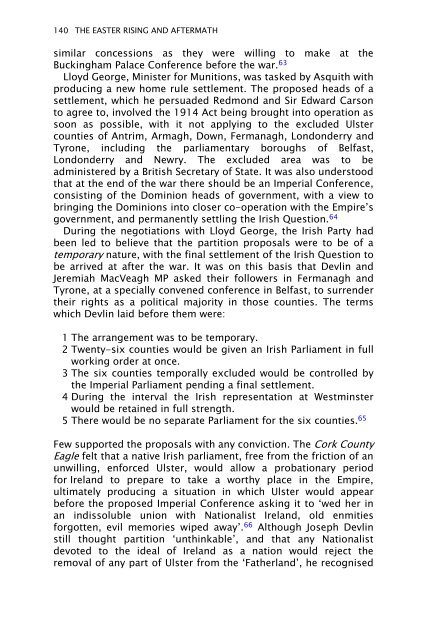Dividing Ireland: World War I and Partition
Dividing Ireland: World War I and Partition
Dividing Ireland: World War I and Partition
You also want an ePaper? Increase the reach of your titles
YUMPU automatically turns print PDFs into web optimized ePapers that Google loves.
140 THE EASTER RISING AND AFTERMATH<br />
similar concessions as they were willing to make at the<br />
Buckingham Palace Conference before the war. 63<br />
Lloyd George, Minister for Munitions, was tasked by Asquith with<br />
producing a new home rule settlement. The proposed heads of a<br />
settlement, which he persuaded Redmond <strong>and</strong> Sir Edward Carson<br />
to agree to, involved the 1914 Act being brought into operation as<br />
soon as possible, with it not applying to the excluded Ulster<br />
counties of Antrim, Armagh, Down, Fermanagh, Londonderry <strong>and</strong><br />
Tyrone, including the parliamentary boroughs of Belfast,<br />
Londonderry <strong>and</strong> Newry. The excluded area was to be<br />
administered by a British Secretary of State. It was also understood<br />
that at the end of the war there should be an Imperial Conference,<br />
consisting of the Dominion heads of government, with a view to<br />
bringing the Dominions into closer co-operation with the Empire’s<br />
government, <strong>and</strong> permanently settling the Irish Question. 64<br />
During the negotiations with Lloyd George, the Irish Party had<br />
been led to believe that the partition proposals were to be of a<br />
temporary nature, with the final settlement of the Irish Question to<br />
be arrived at after the war. It was on this basis that Devlin <strong>and</strong><br />
Jeremiah MacVeagh MP asked their followers in Fermanagh <strong>and</strong><br />
Tyrone, at a specially convened conference in Belfast, to surrender<br />
their rights as a political majority in those counties. The terms<br />
which Devlin laid before them were:<br />
1 The arrangement was to be temporary.<br />
2 Twenty-six counties would be given an Irish Parliament in full<br />
working order at once.<br />
3 The six counties temporally excluded would be controlled by<br />
the Imperial Parliament pending a final settlement.<br />
4 During the interval the Irish representation at Westminster<br />
would be retained in full strength.<br />
5 There would be no separate Parliament for the six counties. 65<br />
Few supported the proposals with any conviction. The Cork County<br />
Eagle felt that a native Irish parliament, free from the friction of an<br />
unwilling, enforced Ulster, would allow a probationary period<br />
for <strong>Irel<strong>and</strong></strong> to prepare to take a worthy place in the Empire,<br />
ultimately producing a situation in which Ulster would appear<br />
before the proposed Imperial Conference asking it to ‘wed her in<br />
an indissoluble union with Nationalist <strong>Irel<strong>and</strong></strong>, old enmities<br />
forgotten, evil memories wiped away’. 66 Although Joseph Devlin<br />
still thought partition ‘unthinkable’, <strong>and</strong> that any Nationalist<br />
devoted to the ideal of <strong>Irel<strong>and</strong></strong> as a nation would reject the<br />
removal of any part of Ulster from the ‘Fatherl<strong>and</strong>’, he recognised








